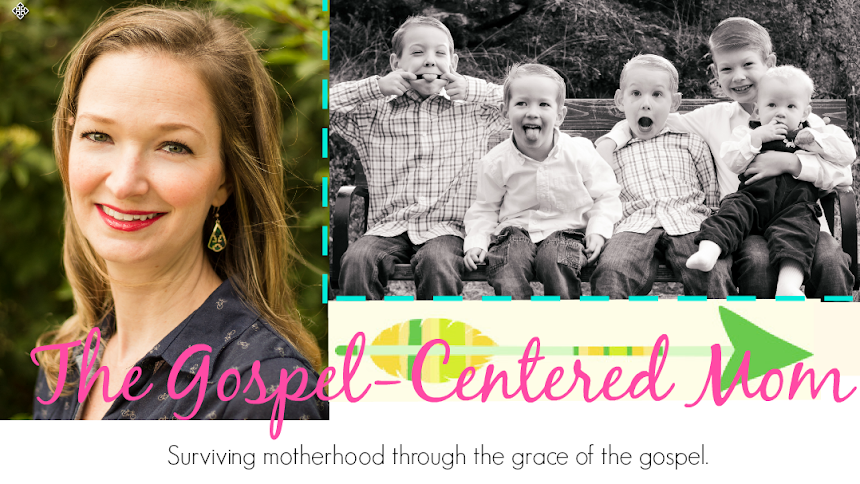Three years ago the Big Question was looming: Are we done having kids? I had just given birth to my fourth son. Life was busy. Busy. We had had
four boys in five years. We had moved four times, started a business, helped
start a church, began homeschooling, and hadn’t had a hot meal in five years. We
should be done...
…right?
How would we know? What if we regretted it? Should we decide
right now? If not now, when?
The question was pulling me in so many different emotional directions. I decided to ask some friends for advice. I chose three friends who
already had more than four kids. I emailed, “How did you decide to have more?” None
of them got back to me. They were all too busy. I got scared. “I guess that’s
my answer,” I thought. “More than four is too many.”
But I was not settled about it. I was waiting for that
feeling. You know, when, “You just know.”
For many women that feeling is crystal clear. Maybe they had
a specific number and timeline in mind and they reached it. They feel like, “Everyone
is here now.” Perhaps pregnancy and birth was so traumatic they couldn’t wait to
close the door to that stage and be done forever.
Other women have had that door closed for them. Maybe it was a health issue that made the final call. Perhaps
the husband made the decision and the wife had no choice but to accept. Some
women are done but they don’t know it yet. They are waiting on God to bring the
next child, but nothing is happening.
Whatever the reason, every mom will eventually face being “done.”
Whether that day is happy or painful, now or later, there is a finality about it.
It’s the end of a stage – a stressful, yet precious stage. If you find yourself
facing the decision of whether or not to be “done,” no doubt you are also
feeling some pressure. Ok, maybe LOTS of pressure. And it’s no wonder. It’s one
of the biggest decisions you will ever make. But I’d like to help relieve that
pressure. Here are three reasons you can relax about the Big Question:
1. You don’t have to know NOW.
I remember holding my fourth infant in my arms, tears
streaming down my face, thinking, “Is this it? I don’t feel done, but we are so
maxed out. Am I being selfish to want more? Maybe it’s not good for the family.
What should we do?” Good grief. Talk about hormonal. Now, those were very
normal thoughts to have, but I was POST-PARTUM. Not the best time to be making decisions
about anything. If you are smack in
the middle of having babies (meaning you are probably feeding a baby while you
read this), you do not need to decide now. Some days you’ll be floating in
babyland, thinking, “How could I ever be done? I never, ever want to stop
having babies.” Then five minutes later you will be begging God not to give you
any more.
Wait. Breathe. Change the next diaper. God has given you
permission to focus on today (Matthew 6:34). Maybe there are more babies in
your future and maybe not, but you don’t have to know NOW.
2. It’s in God’s hands.
No matter what steps you take to have
more babies or to stop having babies, God always has the final say. I'm all for using the resources we have to make responsible plans, but we all know some "oops" babies, whether they are our own or someone else's. Scary? It doesn't have to be. It should relieve the pressure of making a “right” or
a “wrong” decision. God chose the number of children you would have before time
began. Let that
give you comfort as you consider whether or not you are done. Pray, seek wisdom, make the best decision you can, and leave the final
results to God (Proverbs 16:3).
3. It’s okay to be sad.
Whether you have one child or twenty
children there is a sense of loss when you are “done.” It is the end of a
chapter. There is a grieving process. And that’s okay. It might be short or it
might be long. It might even be delayed. That doesn’t mean you aren’t confident
in your decision. You can feel relief that you made the best decision for your
family and feel a sense of loss at the same time. Some women interpret the
sense of loss as regret and think, “I made the wrong choice. I wasn’t ready.”
But that’s not necessarily true. It’s okay for the goodbye to hurt a little. Taking
time to say goodbye to this stage will help prepare you to embrace the next one.
About two years after the birth of my fourth we decided to
try for one more. God gave us the desire of our hearts and we now have five
little boys. Are we done? Humanly speaking, yes. We’ve done everything in our
power to close that stage of life, but we know it’s in God’s hands. Am I sad?
Yes. But I’m also relieved. I feel like a huge “what if” has been taken off my
plate. I anticipate feeling a painful twinge at the next few baby showers I attend, but
I’m also so excited about enjoying this new “big kid” stage.
And if I’m one of those moms who gets an "oops" fifteen years from now…prayer.
"I highly recommend "The Gospel-Centered Mom" Bible study to any mom who is searching for encouragement in the amazing journey of parenting! Sara does a wonderful job of encouraging mom's to stay focused on the Gospel while enjoying their role as mother. As a mom of 4 young children, this study has not only encouraged my heart but has also helped me to refocus my heart." - Erica












